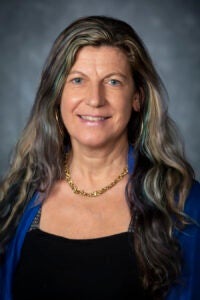This month, we chat with Dr. Katherine von Stackelberg, ScD, senior research scientist and director of research translation in the Department of Environmental Health at the Harvard T.H. Chan School. Dr. Stackelberg has long worked at the intersection of science and policy, originally in assessing public health and ecological risks of exposure to environmental contaminants, which expanded to the role of natural systems, expressed as ecosystem services, in supporting well-being, and the subsequent valuation of those ecosystem services to support policy analyses around planetary health. She is a Principal at NEK Associates LTD and a Senior Research Scientist in the Department of Environmental Health at the Harvard T.H. Chan School of Public Health where she directs Research Translation for a large Superfund program grant. Her ScD dissertation was based on a contingent valuation survey to monetize the benefit associated with risk reductions to ecological receptors exposed to polychlorinated biphenyls in the environment. She is currently working with an international team to develop an ecosystem integrity index (EII; in review) expressed as carbon-weighted hectares, that combines earth observation, machine learning, and confirmatory ground-level data and links to a monetized (or tokenized) valuation of biodiversity attributes. Through this work, she attended the COP15 Convention on Biodiversity as part of the Estonian delegation. Dr. von Stackelberg teaches a course on “socio-ecological systems to support a regenerative future” that focuses on systems analysis, economic drivers of environmental degradation, and transformational systems approaches to support nature-positive decisions by individuals, companies, and governments. Dr. von Stackelberg served on US EPA’s Board of Scientific Counselors, and a National Academies panel on coral reef resilience. She serves as frequent peer reviewer to the European Commission Horizon funding program, and was a peer reviewer to the US EPA on several ecosystem service assessment documents. Dr. von Stackelberg received her ScD, ScM, and AB from Harvard University.
1. What research are you currently working on?
I am currently focused on planetary health, specifically natural systems and the risks that human activities pose to natural systems. For example, a current project involves developing indices for measuring changes in ecosystem integrity (e.g., biodiversity) following calls for action coming out of the Convention on Biodiversity held in Montreal this past December.
2. What impact(s) do you hope this work will make?
Human activity has exceeded the ability of the planet to provide the resources and raw materials that support well-being. 100% of our economy depends on a thriving nature. “Biodiversity” and “climate change” are hot topics right now, but what both require is ecosystem integrity (e.g., biodiversity is not just about the number of species or the number of individuals within a species, you also need connected habitats and things like that). The impact we want to have is nothing short of saving the planet to improve well-being for this and future generations!
3. When you were first starting out, what inspired you to embark on this path of research? Do you have any tips for young investigators?
When I first started out, I was focused on human health and ecological risk assessment, which, over the years, evolved into an emphasis on ecology, natural systems, systems thinking, and the ways in which humans impact the environment, and in turn, the ways in which well-being depends on the environment. My tip for young investigators is to dig deeper on what genuinely interests you, and to think about what really matters. We are truly facing an existential crisis – which is also an opportunity to build the future we want, not the one we think we are supposed to have.
4. How has our Center helped further your research? How do you engage with our Center or hope to engage with our Center moving forward?
I also handle research translation for a related Center, MEMCARE, which is a Superfund Research Program Center. There is quite a bit of overlap across the two Centers, so I absolutely enjoy attending talks, networking with others, and all of those things. I have not applied for funding from the Center, but that’s a good idea!
5. Outside of the academic space, what do you like to do for fun?
I am an eventer, which is a fairly insane equestrian sport that I wouldn’t necessarily recommend, but I wouldn’t do anything else. So I do have a horse, a Dales, who is actually a critically endangered breed (I always say, once you get to know him, you know why !! ha ha just kidding). I do love animals!
6. If you were a dessert, which would it be and why?
Hmmm. That’s a tough one! I guess crème brulee, since it is my favorite dessert 😉 
